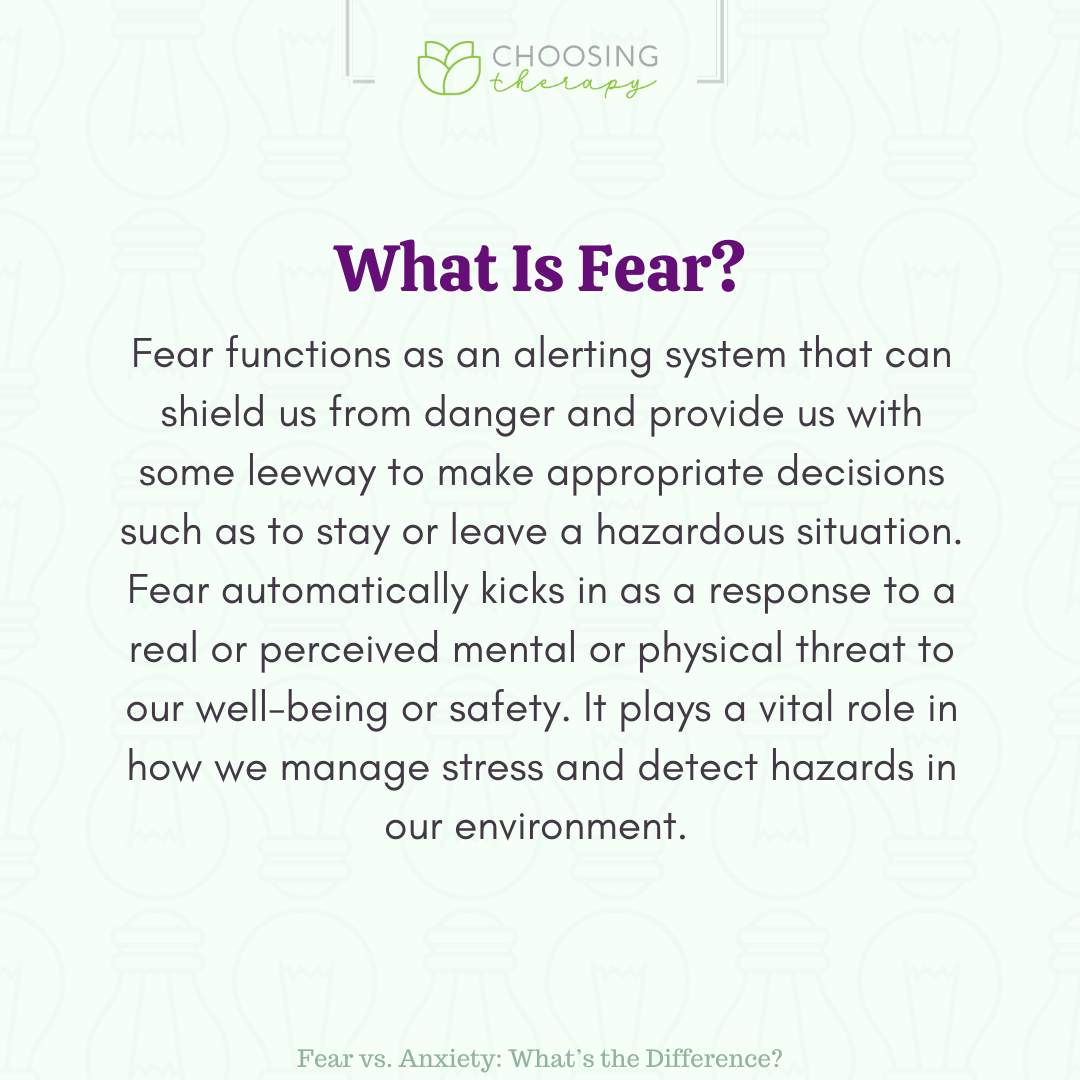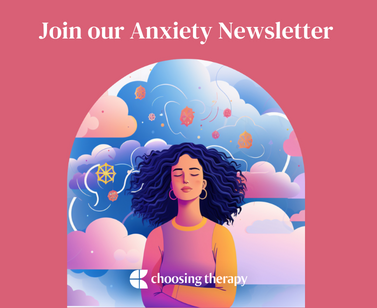Anxiety and fear can feel the same and be easily confused, as fear and anxiety both produce a similar stress response to a real or a perceived threat.1 However, fear is an immediate response to a threat, while anxiety occurs in anticipation of a threat. Examining these different emotions can help you determine what you are truly experiencing.
Find a supportive therapist who can help with anxiety.
BetterHelp has over 20,000 licensed therapists who provide convenient and affordable online therapy. BetterHelp starts at $65 per week. Take a Free Online Assessment and get matched with the right therapist for you.
What Is Fear?
Fear functions as an alerting system that can shield us from danger and provide us with some leeway to make appropriate decisions such as to stay or leave a hazardous situation.1, 2 Fear automatically kicks in as a response to a real or perceived mental or physical threat to our well-being or safety. It plays a vital role in how we manage stress and detect hazards in our environment.
Fear is an emotion believed to have evolved to increase our probabilities of staying safe when faced with a threatening situation. When someone experiences fear, the sympathetic nervous system is activated, and stress hormones like cortisol and adrenaline are released, priming us to either stay and address the concern or escape the event. This reaction is known as the fight-or-flight response, which is deemed to be essential to survival.1, 2
If someone feels a disproportionate level of fear or has a heightened sensitivity to possible threats, that may indicate a chronic psychological condition like post-traumatic stress disorder (PTSD).3, 4, 5
What Is Anxiety?
Anxiety is a natural human emotion in response to a stressful or perceived threatening situation. Anxiety is thought to have evolved to protect us from future endangerment because it alerts us when there is a threat in the future. This cue allows us to make the necessary adjustments and take appropriate measures to cope with the stressors or risks in our environment.
Without anxiety, we would get into trouble, make poor decisions, or neglect life’s responsibilities and obligations. While anxiety may feel unpleasant, a reasonable amount can be useful and even healthy. Short spurts of anxiety can urge us to think through our choices and actions, solve day-to-day problems, and remain productive within society.1, 2
Sometimes, anxious feelings can emerge if you believe you are in danger. In other instances, higher levels of anxiety may be prompted by an overreaction to a threat you perceive as more serious than it really is. These disproportionate reactions usually produce unwarranted, intense, and frequent feelings of anxiety. These reactions are reflected in self-destructive behaviors such as avoidance of anxiety-provoking situations, obsessive worrying or overthinking, social isolation, or dependent behaviors like substance misuse or overeating.1, 2, 3
Is Anxiety Fear?
Many people would agree that there is tremendous overlap between anxiety and fear. Anxiety can certainly make people fearful, and fear can make people feel anxious, but they are different concerns with unique roots and consequences.
Fear vs Anxiety: Key Differences
Fear produces the most obvious, immediate effects because our attention is focused on staying safe. When we are frightened, we feel agitated due to the physical symptoms associated with the fight-or-flight response. This fight-or-flight response is usually extreme and easily recognizable, and thus is more aligned with fear rather than anxiety.1, 3, 4
Fear Goes Away After the Fear-Inducing Event
When we experience fear, we can also feel a sudden surge of mental or emotional distress such as feeling shocked and overwhelmed, as well as different behavioral reactions including aggression or violence. Fear is a protective mechanism enabling us to manage adverse or unpredictable circumstances in the moment. However, once the threat is no longer present, our fear will usually dissipate.1, 3
Fear & Anxiety Feel Similar in Your Body
Anxiety can also produce similar physiological and emotional effects as fear, which is why it is challenging to differentiate between them sometimes.
Fear Is Immediate, Anxiety is Future-Oriented
Fear is an automatic neurophysiologic response rooted in the present. It is a feeling of alarm that is induced by perceived or imminent danger—whether real or perceived. Anxiety is linked to fear, and is a future-oriented mood state that prepares your body for anticipated and perceived threats. It comprises complex biopsychosocial responses. Importantly, anxiety can present even when the stressor is no longer present.1, 4
Chronic Anxiety Has Long-Lasting Effects
Another way anxiety differs from fear is that enduring severe and extended periods of anxiousness can have long-lasting physical, mental, and emotional implications. These implications include fatigue, migraines, digestive issues, sleep disturbances, restlessness, irritability, difficulty concentrating, inability to control worries and overthinking.3, 4
What Do Fear and Anxiety Feel Like?
Here is a list of symptoms that both fear and anxiety have in common:3, 4
Physical Symptoms of Fear & Anxiety
Both fear and anxiety include physical symptoms like:
- Rapid heartbeat and high blood pressure
- Quick breathing or shortness of breath
- Trembling and shaking
- Nausea and upset stomach
- Chest pain
- Sweating or chills
- Muscle tension
- Dilated Pupils
- Dry mouth
Psychological Symptoms of Fear & Anxiety
Fear and anxiety both can include psychological symptoms, such as:
- Feeling overwhelmed
- Feeling out of control
- Feeling detached from your body (dissociation)
- Inability to think clearly
- Impending doom
Why Do I Feel Like This When I’m Not in Any Real danger?
The simplest explanation for this response is that your nervous system overreacts to a perceived danger. Rather than viewing a small concern at a level three, it interprets it as a level ten and responds in kind. This overreaction can build and grow over time. It can also be reduced with hard work and practice using appropriate coping skills.
Options For Anxiety Treatment
Talk Therapy – Get help from a licensed therapist. Betterhelp offers online therapy starting at $65 per week. Free Assessment
Psychiatry for Anxiety – Looking for anxiety treatment that prioritizes you? Talkiatry can help. Find an in-network psychiatrist you can see online. Get started with our short assessment. Visit Talkiatry
How to Overcome Anxiety and Fear
Experiencing fear and anxiety is an uncomfortable situation, but when you make small and consistent changes, you can find ways to move forward and deal with your fear and anxiety.
Here are six ways to overcome anxiety and fear:
1. Get to Know Your Emotions & Triggers
To achieve any wanted changes, you must first have a better understanding of where you are right now. Knowing what what triggers your anxiety, stress, fear, and tension will put you in a position of power and control.
2. Avoid What You Need To
Once you understand your triggers, you can begin to avoid the people, places, and things that cause anxiety and fear. As long as avoidance does not increase the unwanted symptoms, you can feel free to stay away and calm your anxiety.
3. Confront What You Can’t Avoid
If the anxiety triggers cannot be avoided, you can take steps to shift the impact of exposure to these sources. Start by gradually gaining exposure to the discomfort and practice healthy self-talk to remind yourself that the situation may be uncomfortable, but it is not dangerous.
4. Focus on Physical Health
The way you feel physically will have a tremendous impact on the way you feel mentally. Eating well, getting plenty of exercise, and leaving yourself enough time for restful sleep can drastically improve your anxiety and fear. All of these options are generally low risk and good for your overall well being, so feel free to try options that work for you.
5. Try Relaxation Exercises
Relaxation techniques are any cognitive or behavioral techniques used to decrease stress, anxiety, and physical tension. There is a wide variety of relaxation techniques with some working better for some than others. At the beginning of the process, be open and willing to new styles of relaxation and commit to practicing – you could try meditation, progressive muscle relaxation, or breathwork. No techniques work instantly, and consistency is key.
6. Avoid Negative Coping Mechanisms
The above are all positive coping skills because they may be hard in the short-term, but they always yield beneficial results in the long-term. Negative coping skills work in the opposite way by being easy at first but with poor consequences later on. Drinking alcohol, using drugs, overspending money, playing video games excessively, and having risky sex are all negative coping skills. Avoid these whenever possible.
How Do I Know If I Have an Anxiety Disorder?
Fear develops suddenly and is related to a known and well-defined threat, whereas anxiety arises in anticipation of an unspecified and unclear threat.1 Learning more about how you respond to various stressors in your environment can help you determine whether you are experiencing fear, anxiety, or a psychiatric condition that shares common features with fear and anxiety like an anxiety disorder, post-traumatic stress disorder (PTSD), and obsessive-compulsive disorder.3
Ask yourself the following questions to determine whether you are experiencing fear or anxiety:
- Is my fear/anxiety connected to something happening right now?
- Does my fear/anxiety subside once the threat/stress is gone?
- Is my fear/anxiety caused by a non-threatening situation or does it emerge unexpectedly?
- Does my fear/anxiety seem out of proportion to the actual circumstance?
- Do I experience recurrent episodes of sudden feelings of intense anxiety and fear or terror that reach a peak within minutes?
- Do I frequently experience intrusive uncontrollable thoughts that cause me fear/anxiety?
- Does my fear/anxiety keep me constantly mentally preoccupied?
- Are there certain actions that I need to perform over and over to ease my anxiety/fear?
- Does my fear/anxiety stem from a past stressful/traumatic event? If so, has it been persistent?
- Does a specific object, situation, or place almost always provoke a fear/anxiety response?
- Am I frequently avoiding certain people, places, or things that cause me fear/anxiety?
- Is my fear or anxiety persistent and interfering with my ability to enjoy life and function effectively?
In addition to the questions above, consider your risk factors when trying to determine what may be going on. Things to factor in include environmental stressors that may be causing chronic stress, any traumatic life events, family history of mental illness, a medical condition, and your gender. Researchers have found that a combination or the presence of any of these risk factors can make you more vulnerable for developing certain psychiatric conditions linked to anxiety.3, 4, 6
Getting Help for Anxiety
High levels of anxiety can cause substantial distress by interfering with different life domains and could potentially develop into a chronic mental illness. If you feel like your emotions go beyond the normal feelings of nervousness and manageable dread, talk to your doctor or consider finding a therapist who can help you work through these tough feelings. Using an online therapist directory is a great way to find the right fit, since you can filter for specific concerns and needs.3
Anxiety is common and you should not feel any shame for experiencing anxiety symptoms, but if they’re interfering with your life it’s time to talk to a professional. Anxiety disorders represent the most common psychiatric conditions in the United States, affecting approximately 18.1% of the population every year.6
Final Thoughts on Fear & Anxiety
The struggles you are experiencing with fear or anxiety can take an emotional toll on your overall well-being, but you are not alone in this battle. Speaking with a therapist or a trustworthy person in your life can help you manage and confront these intense emotions. Don’t let fear or anxiety get in the way of living your life to the fullest.
Additional Resources
To help our readers take the next step in their mental health journey, Choosing Therapy has partnered with leaders in mental health and wellness. Choosing Therapy is compensated for marketing by the companies included below.
Talk Therapy
Online-Therapy.com – Get support and guidance from a licensed therapist. Online-Therapy.com provides 45 minutes weekly video sessions and unlimited text messaging with your therapist for only $64/week. Get Started
Virtual Psychiatry
Hims / Hers If you’re living with anxiety or depression, finding the right medication match may make all the difference. Connect with a licensed healthcare provider in just 12 – 48 hours. Explore FDA-approved treatment options and get free shipping, if prescribed. No insurance required. Get Started
Anxiety Newsletter
A free newsletter from Choosing Therapy for those impacted by anxiety. Get helpful tips and the latest information. Sign Up
Learn Mindfulness, Meditation, & Relaxation Techniques
Mindfulness.com – Change your life by practicing mindfulness. In a few minutes a day, you can start developing mindfulness and meditation skills. Free Trial
Choosing Therapy Directory
You can search for therapists by specialty, experience, insurance, or price, and location. Find a therapist today.
Online Anxiety Test A few questions from Talkiatry can help you understand your symptoms and give you a recommendation for what to do next. How Does ERP Help With Intrusive Thoughts? Obsessive compulsive disorder (OCD) is a psychiatric condition marked by the presence of obsessive thoughts, images, doubts, or urges, followed by compulsive behaviors or acts aimed at easing the distress caused by the obsession. While the content of the obsessions can take many forms, they are always repetitive, persistent, involuntary, and intrusive, and they often result in a great deal of anxiety for the person experiencing them.












